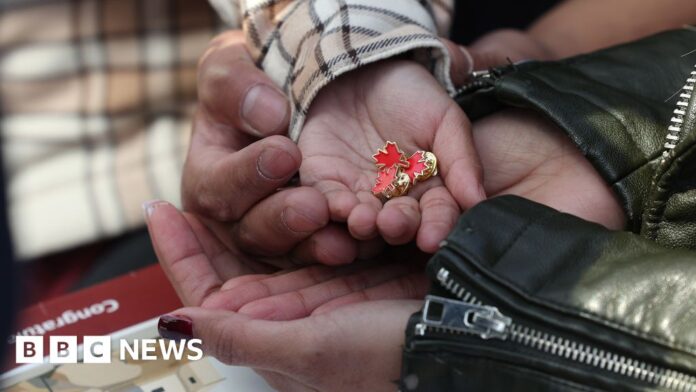For decades, Canada has presented itself as a country open to newcomers, with immigration policies tailored to expand its population, fill labor gaps and resettle refugees fleeing conflict around the world.
But in recent months, Prime Minister Justin Trudeau has said he intends to significantly reduce the number of immigrants allowed into Canada as public concerns grow about inaccessible social services, high costs of living and unaffordable housing.
It's a major shift for both the country and for Trudeau, who ran in 2015 on the basis of embracing multiculturalism as a key part of Canadian identity.
His government is relying on ambitious immigration targets to stimulate economic growth.
In the face of criticism and declining approval ratings, the prime minister now says his government has miscalculated and that Canada needs to “stabilize” its population growth so that public infrastructure can keep up.
On Thursday, Trudeau and Immigration Minister Marc Miller unveiled their toughest immigration cuts yet – a 21% reduction in the number of permanent residents admitted to the country in 2025.
The announcement follows further cuts to Canada's temporary residency programs, which include temporary foreign workers and international students.
Trudeau justified his policy change by saying that “Canadians are rightly proud” of their immigration system.
“It has made our economy the envy of the world,” he said. “This is how we build strong, diverse communities.”
But Trudeau acknowledged that his government “didn't quite get the balance right” when it admitted record numbers of temporary residents to ease labor shortages in the wake of the Covid-19 pandemic and that it was now necessary to overhaul Canada's immigration system “stabilize”. .
His announcement follows dwindling public support for immigration in Canada.
A September poll conducted by the Environics Institute, which has tracked Canadians' attitudes toward immigration since 1977, found that for the first time in a quarter century, a majority now believes there is too much immigration.
The institute said these changing attitudes were primarily due to concerns about limited housing conditions. But the economy, overpopulation and the way the immigration system is managed were also cited as important factors.
In an October newsletter, Abacus Data pollster David Coletto said the idea that “the consensus on immigration is breaking is an understatement.”
“I think the consensus is now broken and I expect this to be one of the most important issues in federal and provincial politics next year.”
Canada has largely welcomed immigrants. Data shows the country is a world leader in refugee resettlement and has earned a reputation for valuing newcomers over the past 50 years.
The Canadian Multiculturalism Act, passed in 1988, recognizes diversity as an integral part of Canadian identity. Its multicultural heritage is also protected in the constitution.
“Since about the late 1990s, Canada's attitude has been largely pro-immigrant,” Michael Donnelly, a political science professor at the University of Toronto, told the BBC.
In 2019, a Pew Research report found that Canada had the most positive attitude toward immigration out of the top 10 destination countries for immigrants.
Professor Donnelly said immigrants make up a large portion of the Canadian electorate, which discourages major political parties from taking an anti-immigrant stance.
Canada has also rarely faced uncontrolled migration problems elsewhere – an advantage of its geographical location, being surrounded by three oceans and the United States to the south – and its immigration system was viewed by the public as open and well-regulated.
But these positive feelings have changed in recent years, Professor Donnelly said.
One reason for this is the unprecedented increase in the number of temporary residents coming to Canada.
According to the Canadian Bureau for International Education, the number of international students increased by almost 30% from 2022 to 2023. Meanwhile, government data shows the number of temporary foreign workers in Canada has doubled in the last five years.
Another factor is the growing feeling that Canada's immigration system has lost its integrity, said Professor Donnelly, partly due to misjudgments by the Canadian government.
The number of asylum applications surged after Canada eliminated visa requirements for tourists from Mexico in 2016, forcing Canada to reimpose visa restrictions earlier this year.
Canadian media have also reported that some international students were using their temporary visas to seek permanent asylum in the country – a trend that Minister Miller called “alarming.”
Professor Donnelly said these and other incidents “have led people to believe that the government has lost control of the immigration flow”.
All of these concerns, he added, are underscored by a housing crisis that has hit Canadians across the country, where a lack of available housing has driven up both rent and home prices for many.
“People will experience large numbers (of new arrivals) and housing shortages and conclude that this is directly causal,” he said.
Professor Donnelly noted that while there has been some racist rhetoric on immigration in Canada, the changing attitudes of Canadians are not primarily due to feelings in European countries or the neighboring United States.
Rather, it is driven by people's desire to dominate the Canadian immigration system.
“The Trudeau government is clearly trying to give the impression that we have this all under control,” Prof. Donnelly said.















